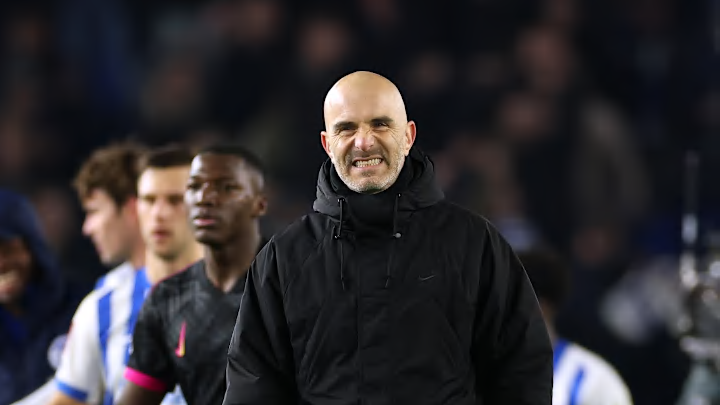Negatives
1. Enzo Maresca’s Approach
Ahead of the game, some fans feared exactly what transpired, and for good reason. Since mid-December, Chelsea’s performances have often lacked clear tactical direction. Once again, they looked devoid of ideas, with their only goal coming from Verbruggen’s mistake in handling Cole Palmer’s weak shot.
Most of Chelsea’s possession consisted of passing between the back five. The top five players with the most touches were the Blues' back four and defensive midfielder Moisés Caicedo. The reason? The players had no idea how to create chances, simply recycling possession and hoping for an opening. The responsibility for that falls on Enzo Maresca.
The one constant in Maresca’s tactics is his insistence on inverting a fullback into midfield, regardless of the opposition or situation. This forces the winger ahead of that fullback into a wingback role, ensuring defensive coverage in case of an opposition counterattack. It doesn’t matter whether that opposition winger is a 20-goal-per-season player or someone with no attacking output, this tactical setup remains unchanged. As a result, Chelsea’s balance is affected in both attack and pressing, and Maresca shows no signs of adjusting.
In the first half, Sancho was the winger primarily tasked with staying back, while Pedro Neto had more freedom to push forward. After the substitutions, the roles were reverse, the left winger could now advance, while the right winger was positioned as a wingback. The issue with this setup was that Tyrique George was on the left and Noni Madueke on the right.
George had struggled to stand out even in Conference League matches, so expecting him to make an impact in this role was as ineffective as Chelsea’s overall tactics. Allowing Madueke to push forward would have been the better option, but Maresca seemed to believe that making the obvious change would unsettle Brighton. Instead, it only made Chelsea’s situation worse.
This squad was good enough to reach the knockout stages of the UEFA Conference League and, at one point, sit second in the Premier League. If they are now struggling this much, it is on the manager. Fans may point fingers at the sporting directors or owners. However, most managers worldwide do not have squads perfectly suited to their preferred style. The difference is that they adapt. If they fail to do so, they are sacked. Right now, Maresca is refusing to adapt.
Brighton had not won at home since early November - three months without a victory. Just last week, they lost 7-0 to Nottingham Forest. Yet Maresca had no plan or ideas to exploit their weaknesses. It was eerily similar to Chelsea’s performance against Ipswich. They still haven’t beaten any Premier League side at home this season, except Chelsea. Meanwhile, a Manchester City side that had looked out of form suddenly appeared dominant against Chelsea, only to lose 5-1 to Arsenal a week later.
